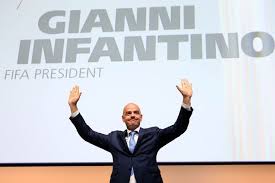By Andrew Warshaw
October 13 – Gianni Infantino insists FIFA has “turned a page” and become far more credible and trustworthy in the first seven months of his presidency despite all manner of allegations against him and the feeling in some quarters than the organisation has actually gone backwards.
Cleared of any wrongdoing by FIFA’s ethics committee following an inquiry about his conduct since taking over from Sepp Blatter, including over his expenses claims and recruitment policy, Infantino chairs the first meeting of FIFA’s new-look Council today and tomorrow.
In the build-up to the eagerly awaited summit, he launched a bullish defence of his controversial leadership in an interview with CNN.
“We have embraced reforms. We have embraced transparency,” he said. “We have embraced good governance. And we move ahead.”
And in a rebuke to his critics, he added: “Definitely there are forces that don’t want change.
“There are forces who maybe don’t want things to come out. I don’t care who they are. I go my way.”
Although the corruption scandal that brought FIFA to its knees is by no means over, Infantino insisted that “the past is the past” and that those he has brought into the organisation will put world football’s governing body back on an even keel.
“We have turned a page. We are now operating and working with a completely different set-up with different people having different functions in this organization in a transparent way, in an open way and that’s the way we will operate.”
Infantino revealed that changing FIFA’s name and even its Zurich headquarters had been discussed in a bid to promote a new image but ultimately was ruled out.
He also insisted that the organisation was committed to driving out racism despite the recent scrapping of FIFA’s anti-discrimination Task Force. Suggesting FIFA no longer cared about racism was totally wrong, he said.
“It’s quite the opposite,” he told CNN. “We are working every day to fight discrimination with concrete actions by rendering this organisation more international. You don’t combat discrimination with a working group or a task force. You combat it with actions, with measures. This Task Force has issued some recommendations which are now being implemented in reality, in fact, and that’s what we are doing.”
As for his much criticised idea of expanding the World Cup finals, either to 40 or 48 teams, Infantino argued: “The quality is certainly there. Let’s not forget in the last World Cup both England and Italy have been eliminated by Costa Rica. If we take our mission seriously of developing football all over the world then there is no greater boost for a country or for a region to qualify for a World Cup.”
With the 2026 World Cup likely to be awarded to CONCACAF, Infantino implied that continental rotation of the finals was the best policy moving forward. “Football is not the prerogative of one or two continents but it’s really the world.”
And co-hosting the tournament, or even multi-hosting, could on occasions be the fairest approach. “Our requirements cannot any more be for one country to have 12 or 14 top stadiums, airports, facilities and so on but look at co-hosting which allows for two or three or four countries together to present a joint bid so everyone can present a reasonable way of organising an event with much less costs involved.”
Contact the writer of this story at moc.l1745073442labto1745073442ofdlr1745073442owedi1745073442sni@w1745073442ahsra1745073442w.wer1745073442dna1745073442

